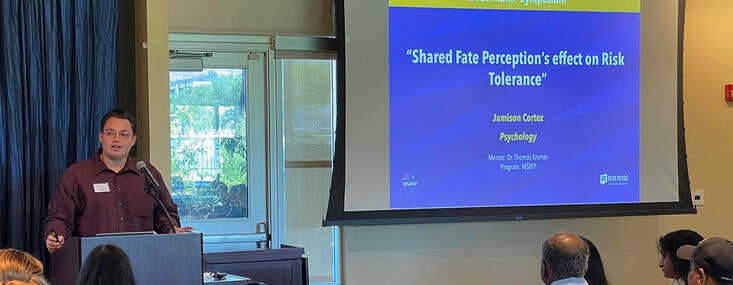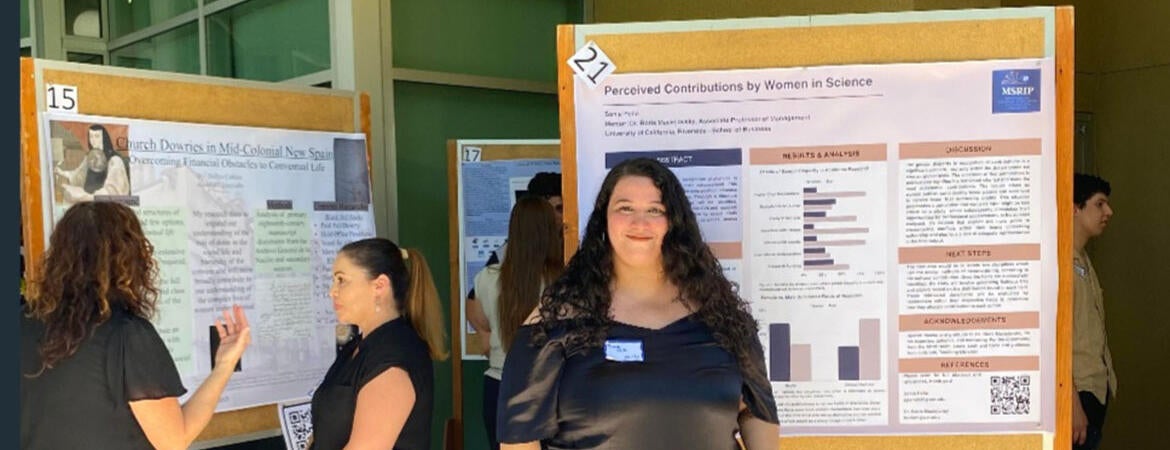
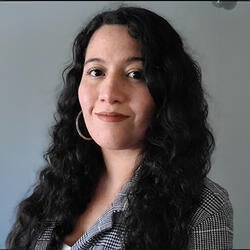
Sonia Peña ’23 hadn’t considered studying beyond her School of Business undergraduate degree. “I was unsure about degrees or higher education beyond a bachelor’s degree because of a lack of knowledge and resources,” she says. “A Ph.D. seemed unrealistic.”
However, when she received an email to apply for the Mentoring Summer Research Internship Program (MSRIP) at UCR, she was curious about the possibilities. The program, part of the Undergraduate Summer Research Program, pairs students from educationally and/or economically disadvantaged backgrounds with a faculty mentor and provides the student with a $4,500 stipend.
The faculty member guides the mentee through a research project, and the program provides workshops and guidance in the pursuit of a doctoral degree at UCR or other University of California campus. At the end of the program, students present their research to staff, faculty, and peers at a symposium.
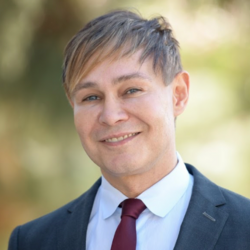
“After learning about the program, I realized it was the perfect opportunity to dabble in research, network with others, grasp the value of higher education, and to learn directly from a research professor,” says Peña, whose mentor was Associate Professor of Management Boris Maciejovsky.
“I knew Sonia as a student from my previous classes, and I knew she would be very organized and methodological, which greatly helps in making the most of the limited period of eight weeks,” says Maciejovsky, who was a mentor in the MSRIP program for the first time last summer. “It’s satisfying to see how productive a relative short period of time can be if students engage with a topic.”
Navigating the Path to a Ph.D.
“I strongly believe in the mission of the MSRIP,” says fellow first-time faculty mentor Thomas Kramer, professor of marketing. “It is important to encourage undergraduates from diverse backgrounds to consider getting a Ph.D.
“Undergraduates often hear about ‘research’ and how important it is, but the term is very vague, so working on a research project with a mentor gives them a much clearer idea of what is involved.”

Psychology major Jamison Cortez ’24 was Kramer’s mentee. “Prior to participating in the MSRIP, I was hesitant about pursuing a Ph.D. because it would take longer than a master’s and cost more,” says Cortez. “But I learned that a Ph.D. is typically cheaper than earning your master’s because universities are far more likely to award scholarships and grants to doctoral students. My perspective completely changed, and during my gap year, I will look at different research programs.”
Cortez was motivated, says Kramer. “He worked hard and was always receptive to my feedback. He has a very inquisitive mind, and I could tell how much he grew over the course of the summer.”
Part of the MSRIP is simply understanding how to navigate the process of finding and enrolling in a doctoral degree program. “We had assignments designed to help us through our grad school applications, including personal history statements, and we worked on our abstract for our research. In workshops, we focused on writing,” says Peña.
Visiting guest speakers also shared their own academic experiences and samples of their research during the program. “A few of my favorite seminars were how to create a research poster, how to network with other researchers, and how to battle imposter syndrome,” adds Peña.
Weekly meetings between mentor and mentee profoundly shaped the experience. “Our meetings offered valuable insight and perspective into the field of academia,” says Cortez of his one-on-one time with Kramer. “Those moments give you the chance to ask questions about anything and everything related to academia, and Dr. Kramer was happy to answer.”
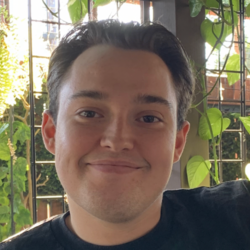
Making Research Real for Undergraduates
“I plan to pursue a Ph.D. in clinical psychology and to work as a psychologist to help people through therapy,” says Cortez, and the topic of his MSRIP symposium presentation was “Shared Fate Perception’s Effect on Risk Tolerance.”
“Personally, I struggle with public speaking, but with everyone’s support, I found presenting to be extremely fulfilling,” says Cortez. “It also helps that you are presenting your own work, which makes it that much more rewarding.”
Peña is interested in the psychology of business: “Especially regarding gender. As a woman who has worked in competitive environments, it is intriguing to translate those real-life experiences and observations into research,” says Peña, who presented her research project, “Perceived Contributions by Women in Science,” at the symposium. “Research on these topics can help motivate companies and individuals to change their perspectives and initiatives regarding gender equality.”
Maciejovsky is familiar with Peña’s path: “I volunteered as a mentor because in my own journey to becoming a researcher, I realized how important role models were and how chance encounters shape one’s future,” says Maciejovsky. “I wanted to make sure to be available for students who might be interested in pursuing a career in research but may not have had close interactions with researchers and limited knowledge of what research entails.”
